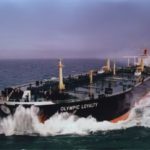Regulatory Gaps Hampering Global Shipping’s Ability to Deliver Paris Targets

MAN Energy Solutions’ Chief Sales Officer has warned that the marine industry is moving too slowly in relation to decarbonisation and is being held back by a lack of regulations that would incentivise a quicker pick-up of synthetic fuels. Speaking at a panel discussion on ‘Climate Analysis and Perspectives’ at the SMM maritime trade fair in Hamburg, Wayne Jones OBE – Member of the Executive Board, Global Sales & After Sales – stated that, without further action, global shipping might significantly overshoot the targets set by the Paris Agreement to limit temperature increase.
He said: “In an earlier analysis with German industry associations, VDMA and VSM, we have shown that – with the appropriate regulatory framework provided – at least in Europe shipping could be climate-neutral by 2045 and not emit any more greenhouse gases after that point. This would be much quicker than projected by the IMO but might still not be quick enough; our current calculations show that the industry would even then fall short of Paris targets because of the overshoot in greenhouse gas emissions accumulating until then. Further action is needed, which also has to focus on the existing fleet.”
Jones’ concern is founded in MAN Energy Solutions’ own analysis of historical and expected CO2 shipping emissions – in part based on OECD projections of maritime fleet development up to 2050 – that predicts a doubling of the maritime fleet and shipping ultimately failing to deliver on the targets of the Paris Agreement in time.
He said: “While shipping easily remains the best transport option in terms of CO2 emissions, we need to minimise an inevitable 2050 emissions overshoot by increasing the speed of greenhouse-gas regulation through specific, ambitious targets. In this respect, while I’m confident that the industry will incentivise newbuildings and encourage dual-fuel take-up, it’s crucial that it also focuses on the challenge posed by the existing, fossil-fuel-burning fleet. Here, it must encourage green retrofits, otherwise any initiatives will have just a negligible effect on total fleet emissions.”

Source: MAN Energy Solutions
Future-fuel partnerships
Jones underlined that there were no technological obstacles for CO2 regulation and that technologies for maritime decarbonisation already exist. Here he gave the example of the containership, ‘ElbBLUE’, owned by German shipowner, Elbdeich Reederei, and operated by charterer, Unifeeder. The vessel is powered by an MAN 51/60DF dual-fuel engine, itself previously converted to operation on LNG in another industry-first. In September 2021, the ElbBLUE bunkered 20 tons of green SNG (Synthetic Natural Gas) – generated from 100% renewable energy via power-to-X technology – in what was a world-first for commercial shipping.
He also pointed to the strong interest in methanol where the technology is proven and retrofits already possible. Similarly, MAN Energy Solutions will introduce a commercial ammonia engine in 2024, with retrofits also possible, where Jones anticipates an even stronger market interest.
MAN Energy Solutions’ analysis shows that the supply and demand of green methanol and green ammonia are in balance until 2025 when methanol is projected to take off at scale and by which time ammonia will have made its market debut. Within the next decade, however, the demand for green fuels for shipping will increase steeply, incurring a gap in supply that could potentially lead to a shortage of green fuels and thus curbing decarbonisation.
Jones concluded: “By virtue of its position, MAN Energy Solutions is in a better position than most to assess the future-fuel mix based on dual-fuel contracting. Regulatory bodies must promptly adopt regulations that invite capital into the production of alternative, green fuels. These would fill the gap between the expected demand and actual supply of green fuels up to 2050 that currently works against us reaching the targets of the Paris Agreement; shipping urgently requires large volumes and thus scalability. Simply put, we must create partnerships with like-minded industry partners to drive decarbonisation as the transition is too great for any one player to handle alone.”
Source: MAN Energy Solutions

 Hellenic Shipping News Worldwide Hellenic Shipping News Worldwide, Online Daily Newspaper on Hellenic and International Shipping
Hellenic Shipping News Worldwide Hellenic Shipping News Worldwide, Online Daily Newspaper on Hellenic and International Shipping






















 PG-Software
PG-Software